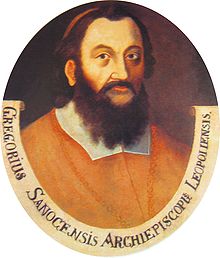- Gregor von Sanok
-
Gregor von Sanok (poln. Grzegorz z Sanoka, * 1403 in Sanok; † 29. Januar 1477 in Lemberg) war Professor an der Krakauer Akademie (seit 1813 Jagiellonen-Universität) in Krakau, Erzbischof von Lemberg, erster Vertreter des Humanismus in Polen und Kritiker der Scholastik.
Inhaltsverzeichnis
Leben
Mit zwölf Jahren[1] verließ Gregor seine Heimatstadt Sanok in Richtung Krakau, wo damals Deutsch als Sprache des städtischen und akademischen Patriziats so wichtig war, dass er aufgrund fehlender Deutschkenntnisse sich aufmachte, die Elbe zu überqueren und in Deutschland die Sprache zu erlernen. Seine zehnjährige Studienreise führte ihn vermutlich bis nach Italien. 1428 kehrte er zurück und schrieb er sich an der Krakauer Akademie ein. 1433 wurde er Professor für römische Poesie. Später war er zuerst Erzieher des Sohns der Familie Tarnowski und dann von Władysław III. (Polen und Ungarn) (1424-1444), der schon als Zehnjähriger gekrönt wurde. Im Anschluss an seinen Aufenthalt in Italien wurde er Pfarrer und hielt dabei enge Kontakte zu wissenschaftlichen Kreisen in Krakau.
1440 bis 1450 hielt er sich in Ungarn auf, wo er zeitweilig Erzieher der Söhne von Johann Hunyadi war und sich am Hof des Bischofs Vitéz aufhielt. Nach seiner Rückkehr nach Polen wurde er Erzbischof in Lemberg (Archiepiscopus Leopoliensis), wo er den ersten humanistischen Hof (?) Polens gründete. Filippo Buonaccorsi widmete ihm 1476, noch zu Lebzeiten, eine Biographie.
Literatur
- Philippus Callimachus Buonaccorsi, Vita et mores Gregorii Sanocei, 1476
Einzelnachweise
- ↑ Harold B. Segel: Renaissance Culture in Poland: The Rise of Humanism, 1470-1543, Cornell University Press, 1989 ISBN 0801422868, 9780801422867 285 pages
With the Vita of Philippus Callimachus (since that is the name the Italian wrote under) as our guide, then, let us explore the career of Gregory of Sanok and his role in the development of Renaissance humanism in Poland. According to Callimachus, Gregory was from the gentry (a claim generally disputed now by Polish scholars, who find no evidence to back it up) and at age twelve ran away from home because of harsh parental discipline. He came to Cracow to further his education and begin a career, but he found that doors were closed to him because he knew no German, the language of the city's urban and academic patriciate. Determined to remedy the situation, Gregory crossed the Elbe into Germany. He spent the next five years traveling (where, we do not know for certain) and earning his living by tutoring (what, precisely we are also unsure of). He must have spent considerable time in German-speaking lands, because he is eventually credited with knowing German well. It is also possible that his travels took him as far as Italy. In 1428, after ten years of a largely itinerant life, Gregory returned to Poland and enrolled in the University of Cracow as a candidate for the bachelor of arts degree. S. 20
In 1418, at only twelve years of age, he ran away and traveled from one town to another until he eventually reached Cracow. He spent a few years there and then left for a five- year stay in Germany. When he returned to Cracow in 1428 to enroll at the university, he had behind him ten years of wandering, propelled by the twin hungers of mind and body. S. 31
Weblinks
- Webseite des Heimatmuseums von Sanok (polnisch)
Wikimedia Foundation.

